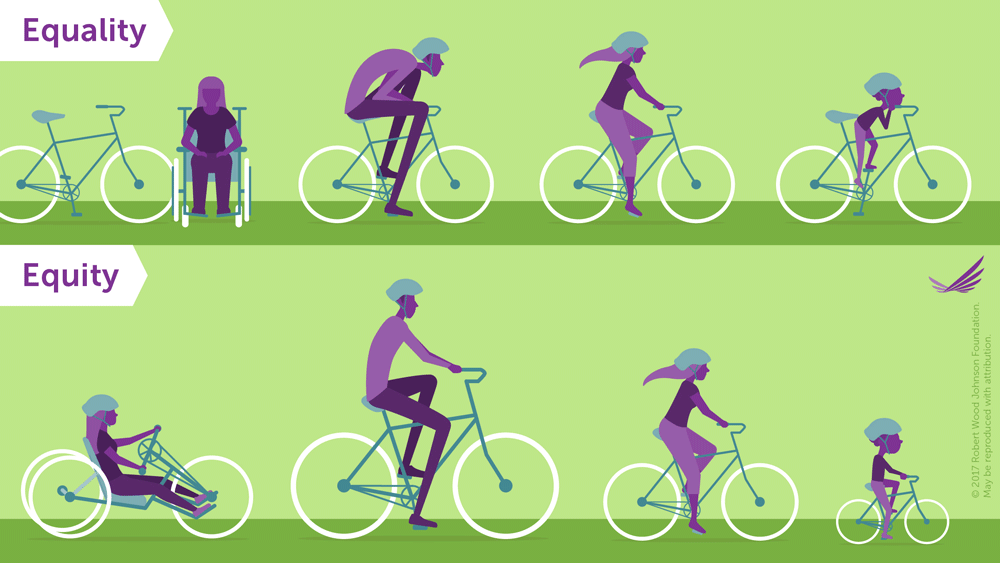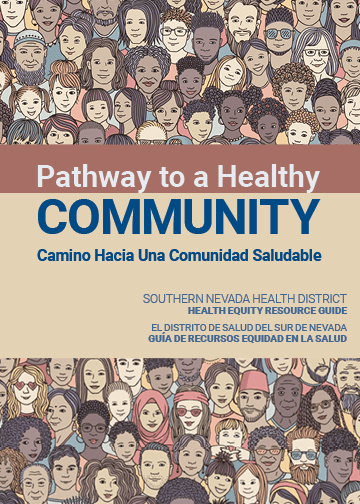Health Equity
The Southern Nevada Health District and its Health Equity Program are committed to eliminating health disparities and advancing health equity in our community. The program builds upon the Health District’s current partnerships with various community organizations and pursues connections with additional ones.
Mission
To work in collaboration between Health District programs and community-based organizations to reduce disparities in health care access and service delivery to underserved populations using health equity strategies, increasing access to essential services, providing education, and conducting community outreach.
What is Health Equity?
Health equity is the state in which everyone has the opportunity to attain full health potential, and no one is disadvantaged from achieving this potential because of social position or any other socially defined circumstance.

Health is For Everyone
Health equity means everyone has the opportunity to attain full health potential, and no one is disadvantaged from achieving this potential because of social position or any other socially-defined circumstance like race, income, gender identification, or physical ability.
The Southern Nevada Health District and its Health Equity Program are committed to eliminating health disparities and advancing health equity in our community. This guide contains some of our programs designed to make sure you have fair and equitable access to your full health potential.
Health Equity Trainings
Health Equity Resources
Podcasts
The Health Equity Program at the Southern Nevada Health District releases a periodic Podcast, Health Equity Chats, or Charlas de Equidad en Salud, to empower marginalized communities by providing awareness and education about health topics related to health equity via audio/video podcast.
Each episode highlights a health equity topic and/or features a guest or special program to provide community members with tools and education to help minimize health inequities. By partnering with community organizations and SNHD program leaders, the platform will help advance health equity and increase access to health care services.
Episodes
Health Equity Chats – The Just One Project (Released 05/07/2025)
Health Equity Chats – National Minority Health Month (Released 04/21/2025)
Health Equity Chats – Diversity and Equity in Wellness (Released 02/24/2025)
Charlas de Equidad en Salud – Platicas de Salud (Released 10/03/2024)
Health Equity Chats – Minority Mental Health Month (Released 07/08/2024)
Entrevista con Fiesta 98.1 FM (aired 11/20/2023)
Charlas de Equidad en Salud – Hispanic Heritage Month (Released 10/25/2023)
Online Resources
Links
10 Essential Public Health Services
Social Determinants of Health and Health Equity – CDC, WHO
Community Partners
The Health District’s Health Equity program is grateful to work alongside community organizations to support communities most impacted by COVID-19 and other health inequities. Our partners work diligently to provide services, education, and other resources to a multitude of populations in Southern Nevada, including:
- Hispanic/Latinx
- Black/African American
- Asian/Pacific Islander
- People experiencing homelessness
- LGBTQ community
- Members of Islamic community
- Immigrants and refugees
- Seniors 65+
- Low to moderate income households
- Medically underserved
- People with disabilities
Our partners are well vested in the communities they serve and are trusted to be a resource for underserved populations. Though the COVID-19 pandemic has been the concentration of our collaboration; providing education, testing opportunities, and improving vaccine equity, the collective goals of our partnerships are focused on increasing overall access to health and closing the gap between health disparities and those underserved populations.







Quick Links
The following Health District programs incorporate health equity strategies into their projects:


